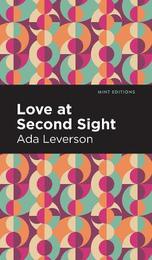
|
Love at Second Sight
Hardback
Main Details
Description
Love at Second Sight (1916) is a novel by Ada Leverson. Having established herself as a journalist and short story writer, Leverson published her debut novel in 1907 to moderate acclaim. Entertaining and effortlessly witty, Leverson's prose paints a stunning portrait of the Edwardian era, a time when hope and relative peace proved prosperous for many. Often compared to her close friend Oscar Wilde, Leverson, a pioneering Jewish woman, remains a unique and refreshing voice in English literature. Love at Second Sight is the third installment in her Little Ottleys trilogy, a series of novels exploring the romantic lives of a hilariously diverse group of friends. Edith and Bruce Ottley seem to have it all-a charming flat, a healthy child, and a group of entertaining friends. Although they are far from perfect-Bruce can be jealous and quite the hypochondriac at times-their marriage remains strong and their home remains a place of refuge to their frequently lovelorn comrades. During the First World War, the Ottleys play host to the mysterious Madame Frabelle, who exercises a strange power over their home. When an old flame of Edith's unexpectedly returns from the war with a serious injury, she finds herself less and less willing to put up with Bruce's tiresome eccentricities. Edith and Bruce do their best to make themselves hospitable while defending their home against the hostilities of love, but the hearts and minds of their eclectic guests prove difficult to assuage. Love at Second Sight is a humorous tale of romance and desire from Ada Leverson, an underappreciated novelist of the Edwardian era. With a beautifully designed cover and professionally typeset manuscript, this edition of Ada Leverson's Love at Second Sight is a classic work of British literature reimagined for modern readers.
Author Biography
Ada Leverson (1862-1933) was a British novelist. Born into a middle-class Jewish family, Leverson was raised alongside eight siblings by Samuel Henry Beddington, a wool merchant, and his wife Zillah. At 19, she married Ernest Leverson, with whom she would raise a daughter, Violet. In the 1890s, she embarked on a career as a professional writer, submitting stories and articles to Punch, The Yellow Book, and The Saturday Review. Through her work as a theater critic, she gained a reputation for her abundant wit and satirical tone, parodying friends and enemies alike in some of England's most popular magazines and newspapers. She was a devoted friend of Oscar Wilde, who supported her literary pursuits and shared her humorous outlook on life. When Wilde was put on trial for his homosexuality, Leverson offered him a place to stay and continued corresponding with the Irish author until the end of his life. She wrote several novels throughout her life, including The Twelfth Hour (1907) and Little Ottleys (1908-1916), a trilogy inspired by her troubled marriage to Ernest, who abandoned her in 1905 to move to Canada. Although far from a bestselling author in her time, Leverson has come to be seen as a pioneering artist whose works display a keen understanding of society's triumphs and shortcomings.
|